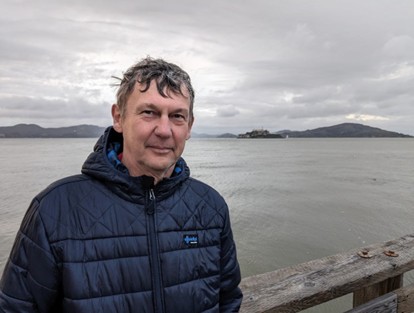
Martin Kákona Awarded Prestigious Fulbright–Masaryk Scholarship for Research with NASA and LBNL
10. 07. 2025

Dr. Martin Kákona from the Department of Radiation Dosimetry at the Nuclear Physics Institute of the Czech Academy of Sciences (NPI CAS) has been awarded the Fulbright–Masaryk Scholarship, enabling him to undertake a four-month research stay in the United States. From October 2025 to the end of January 2026, he will collaborate with scientists from NASA's Ames Research Center and Lawrence Berkeley National Laboratory (LBNL) on a project integrating data from the Czech dosimetry system SPACEDOS into the central RadLab database — a system for measuring cosmic radiation aboard the International Space Station (ISS).
The Fulbright–Masaryk Scholarship is among the most prestigious honors for Czech scientists and educators. It supports long-term stays at leading institutions in the United States as part of the Fulbright Visiting Scholar Program. Receiving this scholarship is not only a personal success for Dr. Kákona but also a recognition of the scientific contributions of the radiation dosimetry group. Fulbright fellowships emphasize international collaboration and knowledge exchange — which, in this case, will materialize through cooperation with NASA and LBNL on a current research project.
"Participating in research for NASA is a dream come true for me, and working in Berkeley — the birthplace of the first cyclotron — is something I never even dared to dream of. I deeply appreciate the opportunity to represent Czech science in such a world-class environment", says Martin Kákona, who will carry out his research in the Radiation Biophysics Laboratory at NASA Ames in California and simultaneously at LBNL. His stay will run from October 1, 2025, to January 31, 2026. During this time, Dr. Kákona will be a guest researcher on the RadLab project — an open scientific database for collecting and analyzing data on cosmic radiation aboard space missions (especially the ISS). His hosting mentors will be experts from NASA and LBNL, with whom he will closely collaborate to achieve the project’s objectives.
The core focus of Martin’s project is integrating data from the SPACEDOS dosimetry system into the RadLab database. SPACEDOS is a portable open-source dosimeter developed for use during space missions. This Czech device, capable of measuring cosmic radiation doses in real time with high precision, has already been tested aboard the ISS. Until now, the ISS has primarily used fixed, stationary active detectors mounted within the station’s modules. For the first time, a portable dosimeter will be integrated into RadLab. This data will complement existing measurements from stationary detectors, giving researchers a more complete picture of the cosmic radiation exposure that individual crew members experience in different parts of the station and during various activities.
Another technical challenge that Dr. Kákona will address is the synchronization of time data. Portable battery-powered systems currently lack access to the station’s central clock, making it difficult to align their data with that of other instruments. As part of the project, tools will be developed to add precise time stamps to SPACEDOS data, enabling synchronization with other detectors in RadLab. This will allow direct comparisons between personal dosimeter readings and measurements from large sensors mounted on the ISS, facilitating the detection of anomalies or local fluctuations in radiation levels. This comprehensive approach will contribute to more accurate assessment of radiation risks to astronauts and to better health protection during long-term space missions.
The integration of SPACEDOS into RadLab represents both a significant scientific advancement and a broader contribution. The RadLab database, maintained by NASA under the Open Science for Life in Space program, is designed as a central repository of cosmic radiation data for the scientific community. Expanding the platform with data from personal dosimeters is seen as a key enhancement of its capabilities. It will enable more comprehensive research into cosmic radiation and its effects — from fundamental understanding of the space radiation environment to practical measures for improving astronaut safety. The inclusion of a Czech device in this international infrastructure also highlights the high standard of research and development at the NPI CAS and opens the door to further international collaboration.
Dr. Martin Kákona has been intensively involved in research on cosmic radiation and dosimeter development for many years. He was previously involved in creating the AIRDOS airborne dosimetry system for measuring radiation in commercial aircraft (now used for refined radiation measurements on board Czech and, for example, South Korean airlines) and later developed the SPACEDOS system for use in space. Martin works in the Department of Radiation Dosimetry at the NPI, focusing on measuring and analyzing ionizing radiation in the atmosphere and space. The Fulbright scholarship will allow him to build upon his work and take it to a global level. Direct collaboration with experts from NASA and LBNL is a major step forward in advancing the international engagement of the department.
The entire team at the Nuclear Physics Institute of the Czech Academy of Sciences congratulates Martin Kákona on this achievement and wishes him great success in his exciting mission in the United States. We are proud that a talented Czech scientist will contribute to NASA’s research programs and bring back new knowledge and experience to enrich our scientific community.
Read also
- The Nuclear Physics Institute of the CAS celebrated its 70th anniversary
- The NPI stand at VědaFest broadcast live on Czech Television
- Second “Day with Theoretical Nuclear Physics” attracted students from across the country
- Martin Schäfer receives Otto Wichterle Award
- NPI organized the ReMade@ARI workshop, focusing on cutting-edge materials characterization and international collaboration
- NPI Co-Organized the 5th Meeting of the EIC International Financial Committee at BNL
- Radiocarbon Dating Reveals Gaps in Elephant Protection
- We are participating in two new projects focused on cosmic rays
- Roman Garba presented his research in Austria and the United Kingdom
- Our Research on Improving Silver Content Measurement in Mushrooms Supported by the AV21 Strategy

